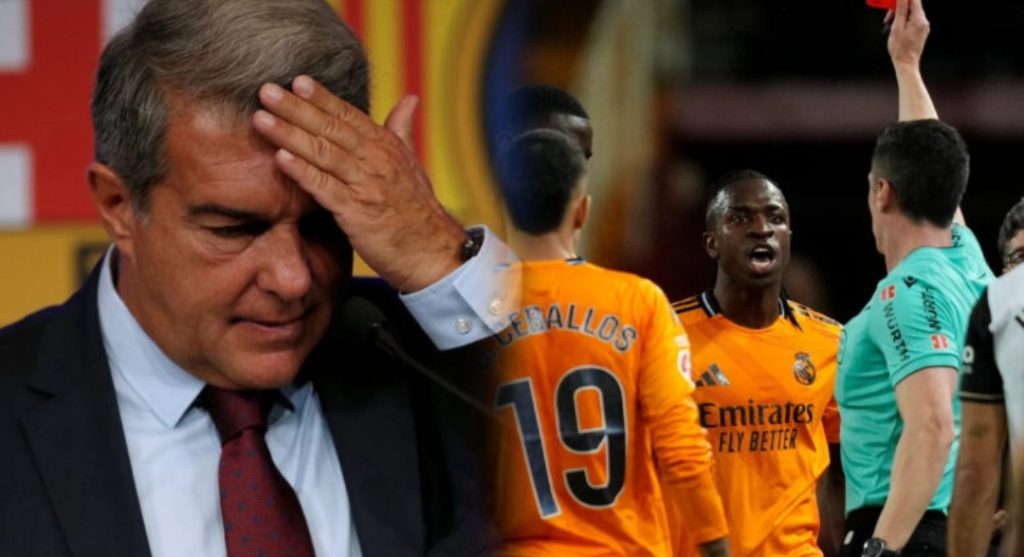Barcelona has entered the fray over the controversial sanction imposed on Vinicius Junior following his dismissal during Real Madrid’s match against Valencia on January 3rd. María Elena Fort, Barcelona’s vice-president and spokesperson, expressed the club’s disappointment and outrage at what she deemed an insufficient punishment for the Real Madrid star. Speaking to ‘El Mon’ on RAC1, she called into question the integrity of LaLiga and the RFEF, hinting at favoritism toward Real Madrid.
Advertisements
The situation has taken on a life of its own, especially considering Barça’s own difficulties with LaLiga. Since December, the Catalan club has faced hurdles registering Dani Olmo and Pau Víctor for the second half of the season due to financial restrictions. Fort used this context to emphasize the apparent disparities in how LaLiga handles disciplinary and administrative matters.
In her remarks, Fort criticized the two-match suspension handed to Vinicius, arguing that his actions warranted a harsher penalty. “He violently attacked the opposing goalkeeper and showed blatant disrespect toward the referee. Two matches? This is unacceptable. Compare this to what Hansi Flick had to endure—there’s no proportionality,” she lamented, referencing Barça’s recent challenges with disciplinary measures.
The frustration didn’t stop there. Fort pointed out that Real Madrid’s perceived leniency is indicative of a broader issue within LaLiga under Javier Tebas’ leadership. According to Fort, Barça has been consistently penalized more severely than their rivals, a pattern she believes undermines the league’s credibility.
Barça’s reaction, while unexpected, reflects broader discontent with the governance of Spanish football. Fort’s comments on RAC1, as echoed in Marca, also highlighted the ongoing issue of player registration. With the case of Vinicius Junior as a backdrop, the spokesperson criticized the double standards she feels exist within the league.
The controversy surrounding Vinicius stems from a heated match at Mestalla, where refereeing decisions were under intense scrutiny. One of the most glaring errors was the disallowed goal for Kylian Mbappé, who was incorrectly flagged offside despite VAR’s availability. The incident, occurring while Real Madrid trailed Valencia, could have dramatically shifted the game’s momentum.
Tensions boiled over following this mistake, culminating in Vinicius’ red card. According to many observers, including Fort, the initial provocations came from Valencia’s goalkeeper. “If fairness were the priority, the goalkeeper would have been penalized first,” she argued, adding that this oversight only deepened the sense of injustice.
Despite Barça’s claims that Vinicius got off lightly, the punishment is not without weight. Alongside his two-match suspension, the Brazilian winger faces a €600,000 fine, with Real Madrid required to pay an additional €700,000. However, these penalties do little to address the larger issues raised by the match, including the racial abuse Vinicius endured from the stands.
The fallout has ignited a firestorm in Spanish football, with Barça and Madrid both voicing their grievances. While Barça accuses LaLiga of favoritism, Madrid’s camp has its own complaints about the officiating during the match. Carlo Ancelotti, visibly angered after the game, described the refereeing as “a disgrace” and promised that the club would push for change.
Barça’s stance on the issue is as much about principle as it is about practical concerns. The club is navigating a challenging season, with financial constraints hampering their ability to compete on equal footing. Fort’s remarks signal a broader strategy to pressure LaLiga into addressing what the club sees as systemic inequalities.
For many Catalans, the Vinicius saga is emblematic of a deeper rot within Spanish football. Fort’s assertion that Real Madrid enjoys preferential treatment resonates with fans who feel their club is unfairly targeted. Yet, critics argue that Barça’s focus on Madrid’s punishment is a diversion from their own struggles.
The timing of Barça’s intervention is also noteworthy. With the January transfer window in full swing, the club’s inability to register new players has placed them at a disadvantage. By spotlighting the disparities in LaLiga’s disciplinary actions, Barça may be seeking to build a case for greater leniency in other areas.
However, the focus on Vinicius’ sanction risks overshadowing the real issues at hand. Racism, officiating errors, and inconsistent governance remain pressing concerns for LaLiga. The league’s handling of these matters will be crucial in restoring its reputation both domestically and internationally.
As the dust settles, one thing is clear: the fallout from the Valencia match has exposed deep divisions within Spanish football. Whether it’s Barça’s claims of injustice or Madrid’s frustration with refereeing, the cracks are impossible to ignore.
María Elena Fort’s fiery comments may have struck a chord with Barça fans, but they also highlight the growing discontent among LaLiga’s stakeholders. For a league that prides itself on being one of the world’s best, the controversies surrounding Vinicius Junior are a sobering reminder of the work still to be done.
Only time will tell whether this episode prompts meaningful change. For now, the battle lines are drawn, with Barça and Madrid once again at the center of the storm.

